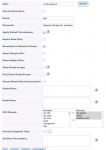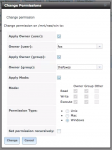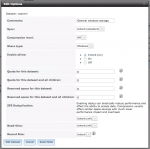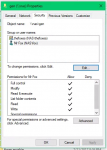jasonbuechler
Dabbler
- Joined
- Mar 28, 2018
- Messages
- 20
So I think I have two separate issues -- the one I'm less interested in is, I'm guessing, a failing 2GB Green disk. I have done zero work looking into that issue, since it's not super concerning to me and I'll replace it this week.
The bigger issue is what the title says: when I try to pull up the properties window for a group of folders on my RaidZ2 nas, I get inexplicably performance-crushing (i'm guessing) i/o activity.
I don't have a clue where to start trying to figure out what's going on here! :'(
I'd be very thankful for everyone's suggestions/explanations, here!!!
Here's some basic info:
The bigger issue is what the title says: when I try to pull up the properties window for a group of folders on my RaidZ2 nas, I get inexplicably performance-crushing (i'm guessing) i/o activity.
I don't have a clue where to start trying to figure out what's going on here! :'(
I'd be very thankful for everyone's suggestions/explanations, here!!!
Here's some basic info:
- dataset with windows acls, no compression, no dedupe, nothing fancy at all
- it takes FOREVER to iterate through the files summing the file sizes
- several minutes for 25000 files (150gb)
- via a windows 10 machine
- reliable 116+ MBps writes across the lan
- nas benchmarks: iperf ~950mbps, & iozone write/read ~160/195MBps (for very large files)
- but much more inexplicably, when I look at the webconsole reporting, there's constant *write* activity across all disks -- FAR more than read activity
- Disk i/o for all members ~375/75 kBps for WRITE/read (what??!!!?)
- Disk-busy ~10% for 3 of the disks, and 30% for the disk that I suspect is dying
- read-latency for "that one disk" about the same as the others, but same iffy disk has write-latency north of 20% when the others have 0%-ish
- I'll include screenshots from the Reporting page
Code:
fox@nas:/mnt/nas/win % zpool status pool: freenas-boot state: ONLINE scan: none requested config: NAME STATE READ WRITE CKSUM freenas-boot ONLINE 0 0 0 da0p2 ONLINE 0 0 0 errors: No known data errors pool: nas state: ONLINE scan: none requested config: NAME STATE READ WRITE CKSUM nas ONLINE 0 0 0 raidz2-0 ONLINE 0 0 0 gptid/be7a6215-3070-11e8-8526-d89ef30c93f5 ONLINE 0 0 0 gptid/bf562aac-3070-11e8-8526-d89ef30c93f5 ONLINE 0 0 0 gptid/c07b6ea8-3070-11e8-8526-d89ef30c93f5 ONLINE 0 0 0 gptid/c18b642d-3070-11e8-8526-d89ef30c93f5 ONLINE 0 0 0 errors: No known data errors fox@nas:/mnt/nas/win % zfs list NAME USED AVAIL REFER MOUNTPOINT freenas-boot 849M 55.4G 64K none freenas-boot/ROOT 841M 55.4G 29K none freenas-boot/ROOT/Initial-Install 1K 55.4G 835M legacy freenas-boot/ROOT/default 841M 55.4G 839M legacy freenas-boot/grub 6.97M 55.4G 6.97M legacy nas 2.51T 912G 128K /mnt/nas nas/.system 4.56M 912G 140K legacy nas/.system/configs-b3147af497d748f98f845f65b942be53 3.16M 912G 3.16M legacy nas/.system/cores 128K 912G 128K legacy nas/.system/rrd-b3147af497d748f98f845f65b942be53 128K 912G 128K legacy nas/.system/samba4 918K 912G 918K legacy nas/.system/syslog-b3147af497d748f98f845f65b942be53 128K 912G 128K legacy nas/htpc 1.30T 912G 1.30T /mnt/nas/htpc nas/jails 128K 912G 128K /mnt/nas/jails nas/photos 48.2G 912G 48.2G /mnt/nas/photos nas/win 1.16T 912G 1.16T /mnt/nas/win fox@nas:/mnt/nas/win % zpool list NAME SIZE ALLOC FREE EXPANDSZ FRAG CAP DEDUP HEALTH ALTROOT freenas-boot 58G 849M 57.2G - - 1% 1.00x ONLINE - nas 7.25T 5.19T 2.06T - 1% 71% 1.00x ONLINE /mnt
Attachments
-
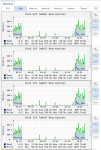 2018-03-28 10_25_51-nas - FreeNAS-11.1-U4 (89e3d93bc).png71.4 KB · Views: 604
2018-03-28 10_25_51-nas - FreeNAS-11.1-U4 (89e3d93bc).png71.4 KB · Views: 604 -
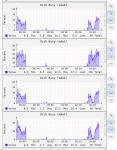 2018-03-28 10_26_06-nas - FreeNAS-11.1-U4 (89e3d93bc).png57.6 KB · Views: 564
2018-03-28 10_26_06-nas - FreeNAS-11.1-U4 (89e3d93bc).png57.6 KB · Views: 564 -
 2018-03-28 10_26_22-nas - FreeNAS-11.1-U4 (89e3d93bc).png62.9 KB · Views: 618
2018-03-28 10_26_22-nas - FreeNAS-11.1-U4 (89e3d93bc).png62.9 KB · Views: 618 -
 2018-03-28 10_26_35-nas - FreeNAS-11.1-U4 (89e3d93bc).png66.5 KB · Views: 575
2018-03-28 10_26_35-nas - FreeNAS-11.1-U4 (89e3d93bc).png66.5 KB · Views: 575 -
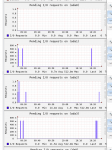 2018-03-28 10_26_48-nas - FreeNAS-11.1-U4 (89e3d93bc).png51.5 KB · Views: 554
2018-03-28 10_26_48-nas - FreeNAS-11.1-U4 (89e3d93bc).png51.5 KB · Views: 554

